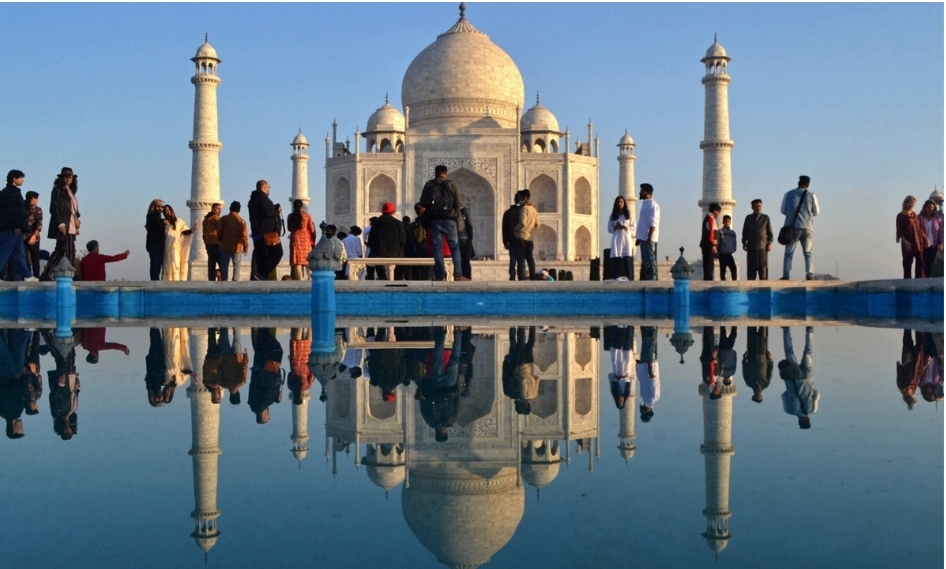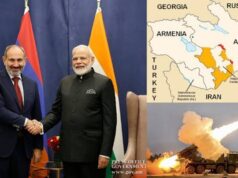With Cooperative Relationship India – China can Steer the World to Peace and Prosperity

Taj Mahal, India
In recent years, India has emerged as the most important player on the global stage. So one of the top relationships that matters for the rest the World is the dynamics of relationship between China and India. They are two of the world’s most populous countries, among top seven by geographical area and both are also the fastest-growing economies of the world. Therefore the relations between China and India have far-reaching implications for the region, for Asia and naturally for the world.
India will soon surpass Germany and Japan within the next three to five years in overall GDP. In PPP terms it has already done so and is the third largest economy of the World.
Till 1600 AD, India was at the top with 30 % of World’s GDP and China was second at 25%, USA was non existent. However, the present scenario, with the growth rates of the US and China stagnating, it would theoretically take at least 20 years for India to surpass the US and China in USD GDP terms. That’s why PM Modi talks of 2047 ( 100th year of Independence from British ) as the goal for India.
Now the world is going to be driven by Asia in general and China and India in particular. Naturally People in both China and India, have their own perceptions of their countries role on the global stage, China-India relations and India-US relations.
Indians show a high level of recognition of their country’s influence and role in both regional and global contexts. Every one is aware that India is the security provider in the Indian Ocean region, the leader of Global South, South Asia and Indo Pacific. India is now in fact as the fourth pole is the balancing force along with the US, Russia and China.
However Communist China leadership seems to be behaving like Ostrich with their head in the sand. They are still in a denial mode with respect to recognizing India as a global leading power and a leader of developing countries in the Global South. This is probably due to the shock received from Indian response during Galwan crisis and thereafter.
Though common public in China instinctively is fully aware of rising India and this is in spite of vice like grip of the Politburo on all aspects of Media and Press.
Chinese leadership is fully aware of India’s comprehensive national strength and growth. With favourable internal and external factors, India is currently having positive strategic development opportunities since independence and rising. India’s relatively good development trend, coupled with the catalysis of the current Indian government’s leadership has sparked confidence and pride among the Indian people.
Though both Chinese Govt controlled media and Western biased media continue to portray India as a country in the second tier of development, lagging behind West and China with a significant gap despite its relatively good development trend. A gate crashing event like the Mangalyaan, Chandrayaan, ICBM launch, incidents like Galwan etc then comes as a jolt.
However most Indians do feel that a close and cooperative relationship between the two countries is possible and will be beneficial for both. Specifically, a “balanced relationship of cooperation and competition” between China and India is recognized in both countries. After all we have a historical record of Non interference into each other’s internal affairs since last over 7000 years.
Presently the border issue between Tibet and India and China and Tibet is considered the main obstacle to the relationship. More than 70 percent of Indian respondents believe that the US is or may be the main factor hindering friendly relations between China and India.
There is also a rational recognition in both countries that being each others biggest neighbour that cannot be moved away, both must cooperate and live like friends. Rise of both cannot be achieved without good relations with its neighbours. Dialogue is better than confrontation, and that the two countries should not see each other as threats, but should recognize each other’s strengths. Maintaining a stable and healthy China-India relationship is in their national interests.
However, as neighbours, connectivity between China and India remains crucial, especially in terms of people-to-people exchange. People in both China and India have a strong desire to learn about each other’s countries. Visiting India for tourism (89 percent) is the primary reason Chinese respondents want to go to India, significantly higher than other reasons. Nearly 30 percent of respondents hope to visit India for short-term business trips or visits. There is still a lack of understanding between the people of China and India, and there is a need to strengthen mutual trust.
Only after removing the border obstacle can the two move further to improve bilateral relations. Both sides can next start with resuming direct flights between the two countries, allowing resident journalists, easing visa restrictions, promoting tourism, think tank exchanges, study abroad programs, and dialogues between civilizations, to prevent the further escalation of discord between the two nations. Hence the main entity is thus the Indo Tibetan border and China Tibet border.
Henceforth India will be adhering to the principle of “India first” when participating in international affairs and handling relations with other countries. This principle will be strongly upheld in all fields of international activities.




